You are here
Syria deal offers hope, but Russia calling shots
By AP - Sep 10,2016 - Last updated at Sep 10,2016

Rebel fighters rest with their weapons in Quneitra countryside, Syria, on Saturday (Reuters photo)
WASHINGTON — Saturday's deal to renew a nationwide truce in Syria, open aid routes and establish a US-Russian military partnership may be the best hope yet to end the brutal five-year civil war. It is also full of potential pitfalls and leaves Moscow with far more power than Washington to determine if there can be lasting peace.
Careful to note the possibility for failure, Secretary of State John Kerry and Russian Foreign Minister Sergey Lavrov were nevertheless upbeat as they announced the agreement after a marathon negotiating session in Geneva that culminated dozens of one-on-one conversations over the past several months. Spurred on by the violence that has enveloped the Syrian city of Aleppo, the two diplomats forged a pact they say departs from previous unsuccessful attempts to halt the bloodshed.
Yet, the new blueprint appears to suffer from a fundamental imbalance common to the earlier efforts.
If US-backed or other rebels fighting Syrian President Bashar Assad break the ceasefire, Russia could threaten to respond militarily or allow his forces to retaliate.
But if Assad breaks the ceasefire, the US has no clear enforcement stick.
Washington is unlikely to attack Syrian forces, given President Barack Obama's long-standing opposition to entering the war, even after Assad famously crossed Obama's "red line" by using chemical weapons in 2013. Allowing the opposition to launch attacks would only risk reopening a fight that the rebels were losing to Assad's Russian-backed military.
As a result, the US strategy seems to rest almost entirely on Russia's good faith.
Moscow can punish Assad by withdrawing the military support that has shored up his position. But if Russia acquiesces to Syrian government violations or breaks the deal itself by hitting US-backed rebels, the only recourse the United States may have is to abandon the ceasefire scheduled to start at sundown Monday and the military cooperation arrangement supposed to take effect seven days thereafter.
Suspicion that Moscow won't live up to its word has fuelled Pentagon scepticism of Kerry's plan.
Sustainability is another potential problem, given the Syrian opposition's rejection of any settlement that leaves Assad in power.
Kerry said the breakthrough could lead to an undefined political transition. He made no mention of Assad leaving power.
Instead, Kerry stressed the importance of Assad's government living "up to its obligations and to work with us", suggesting the Syrian leader could transform himself from international pariah to potential peace partner. After Lavrov said the Syrian government pledged to abide by the cease-fire, Kerry said Assad must be "prepared to live by these agreements, which is critical”.
For Washington, the fighting's brutality and the Daesh terror group's rise now trump any larger gain it might have seen in Assad's departure.
"The suffering that we have witnessed in Syria over the course of more than five years now is really beyond inhumane," Kerry told reporters early Saturday. "People have all seen the pictures — women, children tortured; barrel bombs, gas."
To secure Russia's cooperation, the US hopes the new military partnership is enough of a carrot. For one, it gives Russian President Vladimir Putin a potential "out" of the military intervention he launched in September 2015, without which Syrian government gains could evaporate.
If calm emerges in a Syria that leaves Assad in power, Putin could legitimately claim victory, a pill the US would have to swallow for the sake of peace.
But many mechanics of the ceasefire remain unexplained.
When the ceasefire begins Monday, Assad's air force can still fly combat missions against IS and Syria'a Al Qaeda affiliate, Al Nusra Front, for seven more days. That poses problems because various US-backed rebels intermingle with the Al Qaeda-linked militants, a symbiosis the US must break. A Syrian strike against Al Nusra can easily be perceived as one against the "moderate opposition", confusion that has regularly undermined past truces.
After a week of compliance with the deal, Assad's forces would then be restricted to fighting only Daesh. But even Daesh territory isn't always clear. Its fighters, too, mix with other militants sharing the goal of defeating Assad.
Kerry said Assad's air forces will be restricted to an "area that we have agreed on with very real specificity". The map wasn't shared publicly, even though Kerry said these restrictions are the "bedrock of this agreement".
Enforcement in Aleppo, once Syria's largest city, is especially difficult. Much of Aleppo is under siege, and Assad's forces captured several significant transit points in recent days. Both sides must withdraw from various arteries and communities to allow aid to reach civilians and commercial activity to resume.
Alongside Russia, Assad has received critical military assistance from Iran and its Lebanon-based proxy group, Hizbollah.
Although neither Kerry nor Lavrov mentioned them, their compliance will be needed, too. Iran and its allies often have proved a spoiler to Middle East peace efforts.
Underlying the entire process is US-Russian mistrust. Obama spoke of it a week ago after meeting Putin in China. Lavrov used the word Saturday.
As an aside, Lavrov delivered a sharp indictment of what he labelled "arrogant" new US sanctions against Russia over the crisis in Ukraine.
Nevertheless, he said, Russians "are not offended easily" and want to settle Syria's conflict.
But some of Lavrov's particulars didn't quite match Kerry's, a problem compounded by the lack of a publicly available, written document.
While American officials highlighted the initial, weeklong phase of the truce, Lavrov said it starts with a two-day period and then requires a 48-hour extension.
He said the US-Russian arrangement that comes into force after a week still allows Syrian air forces to be "functional in other areas outside those that we have singled out for Russian-American military cooperation". He didn't outline those areas.
Related Articles
HANGZHOU, China — The United States and Russia struggled on Sunday to keep alive negotiations to end the bloodshed between US-backed rebels
ALEPPO — Under pressure from Russia and the United States, the Syrian army agreed on Wednesday to respect a two-day truce in the war-ravaged
BEIRUT —Warplanes mounted the heaviest air strikes in months against rebel-held districts of the city of Aleppo overnight, as Russia and the














